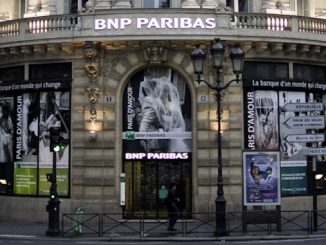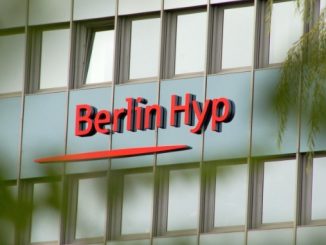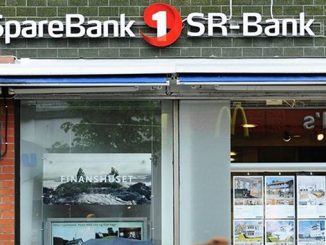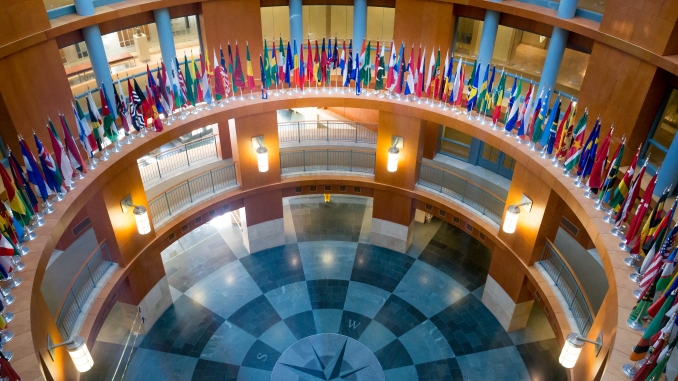
Investors have rallied to a wave of social-style bond issuance from supranationals aligned with the issuers’ role in the fight against the impact of the Covid-19 pandemic, providing at the same time a tonic for ailing fixed income markets. Neil Day explores the trend and the potential for such bonds.
You can also download a pdf of this feature here.
Ten Covid-19-related supranational benchmarks totalling over $10bn-equivalent hit the US dollar, euro and Swedish krona markets between 11 March and last Friday (3 April), with six issuers offering investors variations on the theme of supporting their role in alleviating the social and economic impact of the coronavirus crisis.
Last week, for example, the Nordic Investment Bank (NIB) announced and inaugurated a new Response Bond framework with a €1bn ($1.1bn) three year deal just three days after its Nordic-Baltic government owners activated the supranational’s crisis role of stabilising the region’s economies.
The previous week, the African Development Bank (AfDB) had launched the largest ever dollar-denominated social bond, a $3bn three year “Fight Covid-19” deal issued as a first step in the supranational’s response to the crisis.
“These are critical times for Africa as it addresses the challenges resulting from the coronavirus,” said Akinwumi Adesina, president of the African Development Bank Group. “We are here for Africa, and we will provide significant rapid support for countries.”
As well as helping fund the response to the Covid-19 pandemic, the supranationals’ issuance has been a tonic for ailing fixed income markets.
“Frankly, those issuers taking the lead and stepping in while the market was slightly fractured and being able to print those successful trades was really helpful for the market,” says George Thimont, SSA syndicate at Crédit Agricole CIB.
| Date of issue | Issuer | Labelling | Currency | Size (m) | Maturity |
|---|---|---|---|---|---|
| 11-Mar | IFC | Social Bond | USD | 1,000 | 3 |
| 17-Mar | IFC | Social Bond | SEK | 3,000 | 3 |
| 26-Mar | AfDB | Fight Covid-19 Social Bond | USD | 3,000 | 3 |
| 27-Mar | IADB | Sustainable Development Bond | USD | 2,000 | 5 |
| 30-Mar | NIB | Response Bond | EUR | 1,000 | 3 |
| 31-Mar | EIB | Sustainability Awareness Bond | SEK | 3,000 | 3 |
| 02-Apr | EIB | Sustainability Awareness Bond | EUR | 1,000 | 8 |
| 02-Apr | Council of Europe Development Bank | Covid-19 Response Social Inclusion Bond | EUR | 1,000 | 7 |
| 02-Apr | NIB | Response Bond | SEK | 4,000 | 3 |
| 03-Apr | AfDB | Fight Covid-19 Social Bond | SEK | 2,500 | 3 |
Source: Crédit Agricole CIB, Dealogic
The International Finance Corporation (IFC) kicked off the series of Covid-19 related supranational issues on 11 March with a $1bn social bond, the largest it has launched under a well-established programme. The deal came after the announcement of an IFC package to support emerging market countries affected by the outbreak, with $8bn now set to be deployed to help private companies affected by the pandemic and preserve jobs across sectors including infrastructure, manufacturing, agriculture and services industries.
Denise Odaro, the IFC’s head of investor relations, says the biggest challenge in the social bond issue was indeed the timing the deal right amid the extreme volatility.
“Ultimately, the trade was executed following the worst day in the financial markets since the 2008 crisis, which saw equities and oil tumble and US Treasury yields trade significantly lower across the curve,” she says. “Because of the volatile market conditions, in which swap spreads were changing constantly, we opted for an intraday execution.
“Especially given the state of the market when we launched the trade, we are very pleased with the quality of the order book, the tremendous interest from investors and the attractive pricing accomplished. The bookbuild was remarkable, especially given the circumstances, and resulted in a final order book of over $3.4bn. This allowed us to tighten the spread and eventually price at a spread of 13bps over mid-swaps.”
After the AfDB’s $3bn three year Fight Covid-19 bond was launched on 26 March, the Inter-American Development Bank (IADB) the next day sold its largest issue yet under a Sustainable Development Bond framework, a $2bn five year. The IADB had the previous day announced its priority support areas for countries affected by Covid-19, making up to $12bn available.
Laura Fan, the IADB’s head of funding (pictured), says the dislocations in financial markets explain why the supranational went ahead with a trade on a Friday, which has historically been viewed as a less than ideal day to tap the market.
 “The reason we did that was because in these volatile markets, you jump in immediately when an issuance window opens,” she says, “and though we typically would not have done a deal on a Friday, we didn’t know what the weekend would bring and what the following week would be like. The market was very receptive to a transaction, so we just went straight ahead with the deal.”
“The reason we did that was because in these volatile markets, you jump in immediately when an issuance window opens,” she says, “and though we typically would not have done a deal on a Friday, we didn’t know what the weekend would bring and what the following week would be like. The market was very receptive to a transaction, so we just went straight ahead with the deal.”
She says the IADB drew confidence from the success of the AfDB’s transaction, while differentiating itself by choosing a five rather than three year maturity. The issuer was ultimately able to tighten pricing from initial price thoughts of the 43bp over mid-swaps area to 37bp – equivalent to Treasuries plus 46.2bp – and hit the $2bn size on the back of almost $5bn of demand.
When compared to a five year deal the IADB issued in January, its new five year issue starkly illustrates the dramatic evolution in fixed income markets in the wake of Covid-19: the pricing of 37bp over mid-swaps and Treasuries plus 46.2bp compare with 9bp over and plus 8.3bp, respectively in January, although the new issue’s 0.875% coupon was half that of January’s 1.75%.
Global support for a global cause
The elevated spreads on offer in the new issues may have contributed to the size of books and deals achievable, but those involved attribute part of the success to the Covid-19 linkage of the social, sustainability and response bonds.
“I do think that the ability to sell it as a Sustainable Development Bond, especially in a period of extreme market volatility, generated additional interest and focus by investors overall,” says Fan.
The IFC’s Odaro (pictured) says the successful execution of its dollar social bond is a testament to investors being keenly interested in supporting the alleviation of social issues.

“I believe that the trade benefitted from a flight to quality given that we are a triple A-rated issuer,” she adds, “and our proactive engagement directly with investors on the use of proceeds to address social issues which the ongoing pandemic has exacerbated.
“The trade attracted both new investors to IFC’s social bond programme as well as loyal supporters of IFC’s thematic bonds. We always carefully manage allocation to investors, and for the first time, we also employed a systematic means of allocation based on the investors’ commitment to ESG investing.”
The market dislocations that accompanied the volatility make gauging any potential pricing benefit from the nature of the bonds difficult, but CACIB’s Thimont says the Covid-19 messaging certainly helped in execution.
“What we did see was that when we moved the pricing tighter, almost all the investors stuck with us,” he says. “It’s not necessarily going to stimulate a sizeable order from a plain vanilla asset manager who wouldn’t have bought it anyway, but the motivation to invest is certainly higher for these trades and that may be reflected in them coming with us on pricing or slightly increasing their order size.”
One investor in IFC’s new issue was BlueOrchard, an impact investment manager that is part of Schroders, for its UCITS Emerging Markets SDG Impact Bond Fund.
“The Covid-19 pandemic is affecting the lives of almost everyone on the planet, and it requires a coordinated response in order to help minimise the impact to some of the most vulnerable in society,” said CEO Philipp Müller. “As impact investors, we have a role to play in channelling sources of capital into investments that have the potential to contribute to today’s most difficult societal challenges.
“This social bond issuance is representative of the way in which the public and private sectors can come together to find solutions to the problems faced by wider society.”
Lars Mac Key, head of DCM sustainable bonds at Danske Bank, says that social bonds linked to Covid-19 have attracted a global investor base more akin to green bonds than some prior social bond issuance.
“We have had investors from all over the world in green bonds because carbon is a global issue,” he says, “whereas social bonds have tended to be linked to local activities and perhaps, for example, not everyone cares as much about a domestic social challenge in a Western country. But Covid-19 is, like carbon dioxide, a global message, so we’ve seen a wider spread of regions participating in these bonds.”
One area that has nevertheless proven particularly prominent in Covid-19-related issuance has been the Swedish krona market, where the EIB, IFC and NIB have in aggregate raised more than SEK10bn (€907m, $980m) of funds. The IFC was again first into the market and Odaro says its SEK3bn five year trade, which it subsequently increased by SEK450m, was launched off the back of reverse enquiries following its dollar benchmark.
One of three investors who participated in the initial SEK3bn was Folksam Group, which took SEK700m.
“We are excited about this opportunity to help the fight against the negative effects of Covid-19 and create security for companies and their employees through our investment,” said Folksam CEO Ylva Wessén. “The pandemic we are now experiencing has a major global impact on all parts of society.”
New impetus for social bonds
While the supranationals have almost all issued their Covid-19 under existing social or sustainability bond frameworks and highlighted their roles in helping tackle the crisis, the extent of the earmarking of the use of proceeds has varied. When launching its latest social bond, the IFC flagged how its mission takes in addressing the Covid-19 pandemic and the funds being made available in this regard, while the IADB picked out Sustainable Development Goal 3 – ensure healthy lives and promote well-being for all at all ages – as the theme of its Sustainable Development Bond.
As its moniker might suggest, AfDB’s Fight Covid-19 had the most explicit link to the current crisis.
“It follows the categories that are already defined in the AfDB social bond programme, but the proceeds will be fully allocated to the Covid-19 fight,” says Pascale Forde Maurice in CACIB’s sustainable banking team (pictured). “So it is a transaction that really has a strong use of proceeds characteristic.
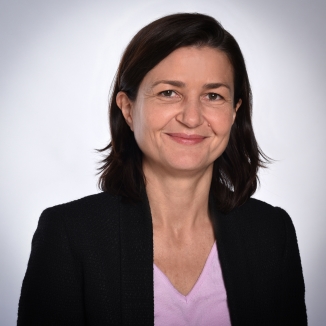 “We have seen different angles taken in the various Covid-19 issues and related communications,” she adds, “which show the large degree of flexibility in social bonds that all fit perfectly within the existing frameworks.”
“We have seen different angles taken in the various Covid-19 issues and related communications,” she adds, “which show the large degree of flexibility in social bonds that all fit perfectly within the existing frameworks.”
The most notable exception to this has been the NIB’s new Response Bond framework – see separate article here for coverage.
Fan at the IADB meanwhile notes that while the latest issue was a Sustainable Development Bond and it also has an EYE (Education, Youth and Employment) Bond framework, all of its issuance is arguably appropriate for ESG portfolios.
“Our mission is to improve lives in Latin America and the Caribbean by supporting efforts to reduce poverty and inequality,” she says, “and we’re aiming to do so in a climate-friendly and sustainable manner while achieving the SDGs.”
Keen to boost the recent mobilisation effort, the executive committee of the Green Bond Principles (GBP), Social Bond Principles (SBP) and Sustainability Bond Guidelines, supported by the International Capital Markets Association (ICMA), last Tuesday (31 March) outlined the role it believes social and sustainable bonds can play in tackling the crisis, while providing a Q&A to encourage issuance.
“We believe that social and sustainability bonds can provide an immediately actionable channel for the market to finance projects that directly contribute to alleviating the social and economic impact of the Covid-19 crisis,” said Martin Scheck, ICMA chief executive. “We strongly support the efforts of the GBP SBP Executive Committee to provide further guidance to the market for these operations.”
As chair of the SBP working group, the IFC has published illustrative case studies to highlight use-of-proceeds that may be considered by issuers evaluating social bonds as a financing option for Covid-19 impact alleviation projects. These range from research and development of COVID-19 tests, vaccines and/or other medications, to loans to small businesses negatively impacted by the economic slowdown.
While the immediate bond issuance response has been dominated by supranationals and others in the SSA sector, market participants believe social and sustainability bonds could be used by other types of issuer to support the response to the pandemic.
Pfizer, for example, inaugurated a sustainability bond framework on 27 March with a $1.25bn 10 year deal, citing work to address Covid-19 among the use of proceeds of a corporate bond that is understood to be the first green, social or sustainability bond from the pharmaceutical sector.
“It’s logical to see the first quick action from the development banks,” says Joop Hessels, head of green, social and sustainability bonds at ABN AMRO, “but there’s a lot of potential for other issuers as well.”
And while the initial response to the Covid-19 pandemic may be focused on healthcare, he suggests the economic impact in the longer term could bring financial institutions into play, noting how some have already issued social and sustainability bond with uses of proceeds related to employment generation and SME financing.
The interest in social and sustainability bonds in light of the Covid-19 crisis is expected to boost overall green, social and sustainability volumes for 2020, which had looked set to be hit by the pandemic as green bond issuance – which has previously made up the bulk of overall supply – fell back from being ahead of 2019 volumes in mid-February to behind as fixed income markets faltered. Market participants point out that several of the new issues would not have occurred or been so large had the crisis not materialised, while social bonds are now expected to make up ground against the larger and more established green bond market.
“Similar to the manner by which climate change became a topical issue and a call to action worldwide which then led to the growth of the green bond market, the current pandemic and its effect on public health and the global macro and political spheres, we believe that the awareness of social bonds is on the rise,” says Odaro at the IFC. “With no additional risk besides that of the issuer, social bonds offer investors access to support social issues including those emanating from Covid-19.
“This has the potential to spur growth of the social bond market significantly.”
Main image: IFC headquarters, Washington, DC; Photo credit: Joseph Rebello/IFC
Why not have a read of our recent green and social bonds roundtable? Featuring Actiam, Amundi, AXA IM, Council of Europe Development Bank, LBBW, NWB Bank, SFIL and Vigeo Eiris. Or download it here.

